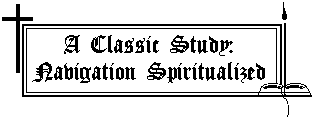

[Here, we continue our reprint of excerpts from John Flavel's book Navigation Spiritualized. John Flavel was a 17th Century minister in the seaside town of Dartmouth, England. A good many of his parishioners made their living on the sea, and so Mr. Flavel wrote Navigation Spiritualized, a book which draws parallels between things of the sea and spiritual things. This book is a masterpiece in the way it communicates spiritual truths in the language of its target audience, the seamen of Dartmouth. In fact, it was written specifically for the seamen to take on voyages and read, so that (for example), while they sailed the boundless seas, they could read of God's boundless mercies; or, while they adjusted their sails for shifting winds, they could read how to prepare their souls for the shifting winds of life; etc. And indeed, though few of us are seamen, we are all on a voyage through this life, so (I dare say) we may all profit from this study.]--Ed.
The navigator shifts his sails to take
All winds, but that which for his soul doth make.
OBSERVATION.
The mariner [lacks] no skill and wisdom to improve several winds, and make them serviceable to his end; a bare side wind, by his skill in shifting and managing the sails, will serve his turn. He will not lose the advantage of one breath or gale that may be useful to him. I have many times wondered to see two ships sailing in a direct counter motion, by one and the same wind. Their skill and wisdom herein is admirable.
APPLICATION.
Thus prudent and skillful are men in secular and lower matters, and yet how ignorant and unskillful in the great and everlasting affairs of their souls! All their invention, judgment, wit, and memory, seem to be pressed for the service of the flesh. They can learn an art quickly, and arrive to a great deal of exactness in it; but in soul-matters, no knowledge at all. They can understand the Equator, Meridian, and Horizon; by the first they can tell the latitude of any place, south or north, measuring it by the degrees in the Meridian; by the second they can tell you the longitude of a place, east and west, from the Meridian, measuring it by the degrees of the Equator; and by the third they can discern the divers risings and settings of the stars. And so in other arts and sciences, we find men endowed with rare abilities, and singular sagacity. Some have piercing apprehensions, solid judgments, stupendous memories, rare invention, and excellent elocution; but put them upon any spiritual supernatural matter, and the weakest Christian, even a babe in Christ, shall excel them therein, and give a far better account of regeneration, the work of grace, the life of faith, than these can. "Not many wise men after the flesh, etc. But God hath chosen the foolish things of this world," etc. (see I Cor. 1:26).
REFLECTION.
How inexcusable, then, art thou, O my soul! And how mute and confounded must thou needs stand before the bar of God in that great day! Thou hadst a talent of natural parts committed to thee, but which way have they been improved? I had an understanding indeed, but it was not sanctified; a memory, but it was like a sieve that let go the corn and retained nothing but husks and chaff; wit and invention, but, alas! none to do myself good. Ah! how will these rise in judgment against me, and stop my mouth? What account shall I give for them in that day?
Again, are men (otherwise prudent and skillful) such sots and fools in spiritual things? Then let the poor, weak Christian, whose natural parts are blunt and dull, admire the riches of God's free grace to him. O what an astonishing consideration is this! That God should pass by men of the profoundest natural parts and choose me, even poor me, whose natural faculties and endowments, compared with theirs, are but as lead to gold! Thus under the law He passed by the lion and eagle, and chose the lamb and dove. O how should it make me to advance grace, as Christ doth upon the same account. "I thank thee, Father, Lord of heaven and earth, that thou hast hid these things from the wise and prudent, and revealed them to babes" (Matt. 11:25). And let it ever be a humbling consideration to me; for who made me to differ? Is not this one principal thing God aims at, in calling such as I am; that boasting may be excluded, and Himself alone exalted?
